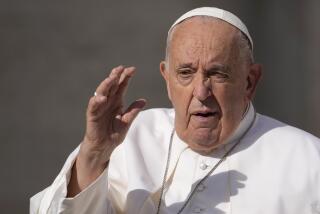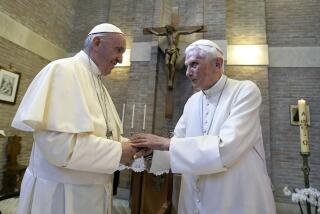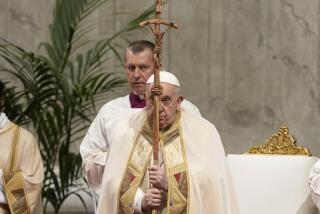Pope Issues a Rare âSorryâ
ROME â In his first public appearance since igniting a firestorm in the Islamic world, Pope Benedict XVI on Sunday said he was âdeeply sorryâ that Muslims were offended and outraged by his use of a medieval citation critical of their faith, saying it did not âin any way express my personal thought.â
The pope used his weekly Angelus blessing, at the papal summer residence in Castel Gandolfo outside Rome, to confront the most serious controversy of his 17-month-old papacy. For a pope, it was a highly unusual gesture of regret.
By making a personal and public apology, Benedict hoped to calm the fury that exploded after he delivered a major address last week at Germanyâs University of Regensburg in which he quoted a 14th century Byzantine emperor who regarded some of the prophet Muhammadâs teachings as âevil and inhuman.â
Major Arab television networks gave considerable coverage to the popeâs Sunday message; the Al Arabiya network carried it live. Initial reaction from Islamic groups was mixed, with many saying they still wanted a fuller apology.
In Somalia, gunmen shot an Italian nun to death outside a childrenâs hospital in the capital. It was not immediately clear whether the shooting of Leonella Sgorbati, 64, was related to the papal controversy, but Somalian Islamic extremists had threatened to attack Catholics.
âWe hope this remains an isolated act,â Vatican spokesman Father Federico Lombardi told the Italian news agency ANSA. But he said he feared it could be âthe fruit of the violence and irrationalityâ that have arisen from the popeâs speech âwithout motive or justification.â
The Italian Interior Ministry, meanwhile, said it had raised the level of the security alert in parts of the country in reaction to the international protests. National Police Chief Gianni De Gennaro, in a statement, called on authorities to be especially vigilant of Catholic sites, noting the presence in Italy of a radical Islamic minority.
At Castel Gandolfo, security was tighter than usual. Police sharpshooters overlooked the piazza where the crowd assembled to hear the pope. Guards screened the estimated 2,000 pilgrims, ushering them through metal detectors and checking purses and backpacks.
The pope, who had emerged on the balcony of his palazzo, had begun addressing the crowd when a huge downpour drenched everyone in sight. He chuckled and apologized for the weather, adding that rain was also a sign of Godâs work. Then he continued with the more serious matter at hand.
âI am deeply sorry for the reactions in some countries to a few passages of my address at the University of Regensburg, which were considered offensive to the sensibility of Muslims,â he said, adding that the quote from Emperor Manuel II did not reflect his own opinion.
Benedict noted that on Saturday, Cardinal Tarcisio Bertone, the No. 2 official in the Vatican, had offered a written clarification of the meaning of the popeâs speech. The statement also relayed the pontiffâs âdeep regrets.â But many of the popeâs critics wanted to hear it from Benedict himself.
âI hope that this serves to appease hearts,â Benedict said, âand to clarify the true meaning of my address, which in its totality was and is an invitation to frank and sincere dialogue, with great mutual respect.â
Regardless of how Benedictâs Sunday message is accepted, damage has been done to the Roman Catholic Church and its international mission, analysts said. In the minds of many Muslims, the pope has cemented what they see as his disdain for their faith, a perception that imperils inter-religious dialogue and could only further sour ties between Muslims and Christians at a time of global confrontation.
Several of the Islamic leaders who rose to condemn Benedict in the last several days have cast him as part of what they see as a vast Western conspiracy against Islam, and have put him in the same category as President Bush.
The popeâs Regensburg lecture, to an audience of academics at the school where he taught theology in the 1970s, was a long and complex treatise on faith and reason. Among other elements, it said that violence could not be justified by religion, and he used the term jihad, which he defined as Islamic holy war, as an example.
The pope on Tuesday had quoted the emperor as saying: âShow me just what Muhammad brought that was new, and there you will find things only evil and inhuman, such as his command to spread by the sword the faith he preached.â
The speech was designed to provoke a theological debate, Vatican officials said.
Benedictâs predecessor, John Paul II, apologized at least 10 times during his long papacy for sins committed by the Roman Catholic Church or its members -- including slavery, the conquest of indigenous populations in Latin America, and the Holocaust. But none of those acts of contrition was a personal statement about the consequences of the popeâs own comments.
As Benedict began Sundayâs apology, some in the audience shouted and clapped, suggesting either their approval or that they thought he did not need to qualify his remarks. Many of the popeâs supporters believe his words were taken out of context and agree with his more cautious approach to Islam and interfaith dialogue.
Across the Islamic world, the response was one of skepticism. One official of the Muslim Brotherhood, one of the largest and most influential Islamic movements in the Middle East, was quoted as saying the popeâs statement was a âgood step.â But others were not satisfied.
âThe popeâs apologies were not enough because, in his aggression, he clearly knew and meant what he said,â Jihan Halafawi, director of the Islamic and Political Bureau of the Muslim Brotherhood, said in Cairo. âWe need a clear and direct apology to all the Muslims in this world.â
Opinion in Turkey was not unanimous, but the Turkish foreign minister said the pope was welcome to proceed with a trip to the Muslim nation scheduled for November. The visit was thrown into doubt amid the outcry over Benedictâs remarks, with some of the sharpest criticism coming from senior Turkish officials.
âFrom our point of view, there is no reason to change the date of the popeâs visit,â Foreign Minister Abdullah Gul said in Ankara, according to the official Anatolian news agency.
Gul said the terms used in the popeâs original speech were âunfortunate,â but he wrote to the pontiff urging him not to postpone the trip because it would serve as a valuable way to promote dialogue between cultures.
In contrast, Turkish Minister of State Mehmet Aydin complained to reporters that the pope seemed to be saying he was sorry for the angry reaction but not for the remarks themselves.
There is already a measure of anti-papal sentiment in Turkey because of statements Benedict made before he became pope that opposed the countryâs efforts to join the European Union.
Elsewhere, hundreds of Iranians also demonstrated against the pope in cities nationwide, the Associated Press reported. In Qom, the religious capital of Iranâs 60 million Shiite Muslims, hard-line cleric Ahmad Khatami said the pope and Bush were âunited in order to repeat the Crusades.â
Iran recalled its ambassador to the Holy See, the second country after Morocco to do so.
Palestinians torched two Christian churches in the West Bank, the second consecutive day of such attacks there. No injuries were reported.
*
Times staff writers Edmund Sanders in Mogadishu and Caesar Ahmed in Cairo contributed to this report.
More to Read
Sign up for Essential California
The most important California stories and recommendations in your inbox every morning.
You may occasionally receive promotional content from the Los Angeles Times.











